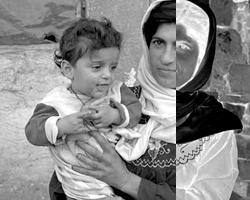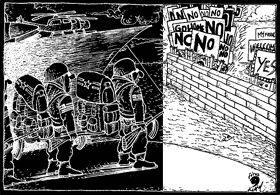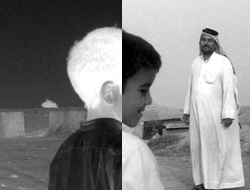|
..:: War-Time Casualties The size of civilian casualties is as yet unclear. The Pentagon has refused to count Iraqi civilian casualties, and organizations trying to assess the number of Iraqi dead have said that the number may be unknowable. The Red Cross has stopped counting the wounded because the casualties were too high. Rep. Chris Shays, the first Congressman to go to Iraq, has said that humanitarian aid isn't reaching Iraqis quickly enough. Widespread civil strife — chaos in Baghdad, US troops firing into a crowd of protestors in Mosul, the rampage of a US-backed militia in Najaf, looting encouraged by British troops, the Kurdish expulsion of Arabs from northern villages — is exacerbating the damage of the war. Where US troops have imposed order on civilians, Iraqis have been restive. A US soldier said Iraqis misunderstood US use of force: "It's a show of force, but people don't understand it. They're not grateful." Amnesty International has charged that the US was better prepared to protect Iraqi oil wells than to protect hospitals, water systems or civilians. Iraqis have questioned the fact that US troops did not protect hospitals and museums, but did guard the Oil Ministry, the Interior Ministry and the Irrigation Ministry. While there was a certain amount of caution in the early days of the war, officials at the Department of Defense have said that US military commanders later turned to aggressive air attacks, including attacks on heavily populated areas, which risked large numbers of civilian casualties. The rules of engagement also changed. Lt. Col. Wes Gillman, commander of Task Force 130 of the 3rd Infantry Division, told his men, "If you see an Iraqi in civilian clothes coming toward you — even with a stick — shoot it." Lt. Col. John Charlton, commander of the 1st Battalion, 15th Infantry Regiment, told his troops, "When we move in[to] Baghdad, you kill anything that moves." Vigorous fighting by Iraqi forces emboldened US leaders, and the attack on US forces by a suicide bomber made US troops extremely wary of Iraqis. Iraqi guerilla tactics and mingling with civilians also made distinctions between military and civilians difficult. The killing of 12 civilians by US forces at Nasiriyah has been described as a turning point in the war: the point at which US soldiers lost their caution and began talking of "nuking" the place. A US marine, Cpl. Ryan Dupre, said: "The Iraqis are sick people and we are the chemotherapy. I am starting to hate this country. Wait till I get hold of a friggin' Iraqi. No I won’t get hold of one — I’ll kill him." British military strongly criticized US use of force against civilians. Three British soldiers in Iraq were reportedly ordered home for protesting the extent to which civilians were being killed. On 11 February, 2003, Powell told a congressional committee that war on Iraq "will be done in a way that will be seen as surgical." Since the start of the war, however, there have been a number of reports of civilian casualties and simmering anger at Coalition troops. Iraqi opposition figures have become apprehensive about casualties. The Pentagon's Shock and Awe war plan launched between 300 and 400 cruise missiles at Iraq. The battle plan aimed for psychological terror rather than the physical destruction of military forces. The target was not the Iraqi army, and the battle plan was designed to bypass Iraqi divisions whenever possible. Shock and Awe aimed more cruise missiles at Iraq than were launched during the entire Gulf War, where US reliance on crushing air power, as well as Saddam's strategies and the terrain, led to the deaths of an estimated 90,000 to 150,000 Iraqi civilians. The worst fears for the war were not realized: while there were reports of oil well fires being alit near Basra, and explosives placed near the oil fields of Kirkuk, Saddam Hussein did not order the oil fields to be set afire, as he had threatened to do. The Bush administration sent Patriot anti-missile batteries to Israel and Jordan to protect against chemical warheads, and did not send protective equipment to the poorly-equipped Kurds, but fortunately, Saddam Hussein did not resort to chemical and biological weapons. Before the war, the UN estimated that up to 500,000 Iraqis could suffer serious injuries, and estimated that 10 million Iraqi civilians, including more than 2 million homeless, would be in need of immediate assistance for food and medicine. ..:: Post-War Casualties The war will continue to kill Iraqis long after it is over. Cluster bombs continue to hurt and kill Iraqis even where combat has come to a close. US air attacks scattered cluster bombs into heavily populated areas and civilians, especially children, continue to trigger unexploded munitions. The effects of cluster bombs and fuel air explosives are so horrific that five British officers resigned their commissions during the first Gulf War after having seen their effects. Cluster bombs were heavily used in Afghanistan, in violation of international law, and despite initial denials, are being used again in Iraq. Chemical pollution from ordnance and bombed facilities will also make Iraqis sick and degrade the environment. The Pentagon has no plans to measure or assauge pollution, but UN agencies may gauge the damage and recommend solutions to contamination. Depleted uranium is also being used again in Iraq. US use of depleted uranium in the first Gulf War has been linked to the cancers that are still manifesting in Iraqi civilians, as well as to Gulf War Syndrome in US soldiers. The US has said it has no plans to remove debris from depleted uranium weapons in Iraq. Anti-personnel landmines from the first Gulf War continue to kill Iraqi civilians. Canada has banned the use of landmines, and Canadian soldiers in Afghanistan refused to sow landmines when directed to do so by their American commander. Despite the fact that US policy has committed to ending military use of landmines outside Korea by 2003, the Pentagon plans on using landmines again in Iraq. Secretary of Defense Donald Rumsfeld and Gen. Richard Myers, Chairman of the Joint Chiefs of Staff, testified to the US House Armed Services Committee on February 5, 2002, that the US may also use non-lethal chemical weapons in this war. Victoria Clarke, an assistant secretary at the Department of Defense, confirmed that the US would use chemical riot control agents in Iraq, in contravention of the Chemical Weapons Convention. The US Marine Corps has said that CS gas and pepper spray has been shipped to the Gulf. ..:: Sanctions-Related Casualties Iraqis are still reeling from the effects of the first Gulf War and a decade of sanctions. Duriing the first Gulf War, the US attacked Iraqi electrical, water, and sewage treatment systems, killing thousands of civilians, although international law specifically prohibits civilian targets. The Washington Post concluded that "damage to civilian structures and interests, invariably described by briefers during the war as 'collateral' and unintended, was sometimes neither." The US also used prohibited weapons of mass destruction. Fuel air explosives, napalm, oil well fires, cluster bombs and anti-personnel fragmentation bombs were used on civilian as well as military populations. After the war, sanctions were imposed which the UN estimates have killed more than 500,000 Iraqi children. While Saddam exacerbated the effect of sanctions on Iraqis, the US has also used sanctions in ways that violate international law and cause severe hardship for Iraqis. The US intentionally used sanctions to degrade Iraq's water supply after the Gulf War, which violates the Geneva Convention. According to DIA documents, the US withheld approval for Iraq to import the few chemicals and items of equipment it needed in order to clean up its water supply, fully cognizant that this would exacerbate the spread of communicable diseases. ..:: Casualties in the No-Fly Zone The US-patrolled "no-fly zones" offered some protection for the Kurds in the North and Shiite Muslims in the South from Saddam Hussein's despotism. The Air Force dropped bombs consistently from the first Gulf War to this one, sometimes killing Iraqi civilians. But more important than Air Force error is the fact that the northern zone was only a "no-fly zone" for Saddam's aircraft. The US allowed Turkey to interrupt US patrols to bomb Kurdish villages in Iraq, as well as to protest US refusal to sell Turkey certain precision-guided bombs. US forces returning to the "no-fly" zone would see "burning villages, lots of smoke and fire." |
LIES | THRIVES | ACT | CONTACT
Related Articles : British Military Critical of US Troops' Heavy-handed Style with Civilians, Guardian : Troops' Rules of Engagement: 'Kill Anything That Moves', Stars & Stripes : Interview with an Iraqi, Democracy Now : Warnings, Disputes over Iraq Aid, MSNBC : Red Cross: Iraq Wounded Too High to Count : The Toppling of Saddam — an End to 30 years of Brutal Rule, Guardian : Iraq Humanitarian Crisis Verging on Catastrophe, Baltimore Sun : Iraqi Kurds Celebrate Saddam's Downfall, AP : Baghdad Seethes With Anger Toward US, AP : Number of Iraqi Dead, NYT : Iraqis Discuss, Protest US Plans for Gov't, WP : Aid Not Moving Fast Enough, USA Today Freedom for Iraqis Among other things, the Bush administration has also said that this war was a fight for Iraqi freedom. Sami Abdul-Rahman, deputy prime minister of the Kurdish administration, responded, "Conquerors always call themselves liberators."
Places to Donate to Assist Iraqis : Red Cross International Response Fund : OxFam America Concerned About Iraqi People Iraqi Opposition Groups : Overview of Iraqi Opposition Groups : US Plan to Impose Regime on Iraq, Guardian : Iraqi Opposition Against Invasion : Flashback for the Kurds, NYT : Dawa Opposes Bush's War, Guardian : Iraqi Left Opposes War, LA Weekly : Shia Group Opposes US Rule, Reuters : After Saddam by Kanan Makiya : Iraqi Opposition Afraid of High Casualties, Al-Ahram Iraqi Exiles Against War : Letter to Blair from 160 Exiles, Guardian : Iraqis Will Not be Pawns by Kamil Mahdi : Bombs Will Deepen Iraq's Nightmare by Haifa Zangana : Statement by Iraqi-American Student by Rana Abdul-Aziz : You Should Have Known We'd Fight by Burhan al-Chalabi : Use Politics, Not War by Faleh Jabbar : Oppose War and Indict Saddam by Sermid Al-Sarraf : Guardian Round-up: Maysoon Pachachi, Salah Awad, Jabbar Hasan, Dr Salih Ibrahim, Amani, Nuri Jacob, Nadia Mahmoud, Amani : Metro Iraqis' Hearts Torn by Threat of War, Detroit News : Iraq Native Views War Differently, FWS : Thousands of Iraqis Head Home to Fight Against US, USA Today
The Results of the First Gulf War : The Gulf War: Not so Clean, The Bulletin of Atomic Scientists : US War Crimes during the Gulf War by Francis Boyle : Economic Sanctions as a Weapon of Mass Destruction, Harper's : How the US Intentionally Destroyed Iraq's Water Supply, Progressive : The Unseen Gulf War, photos by Peter Turnley : This Is War, photos from The Memory Hole |





